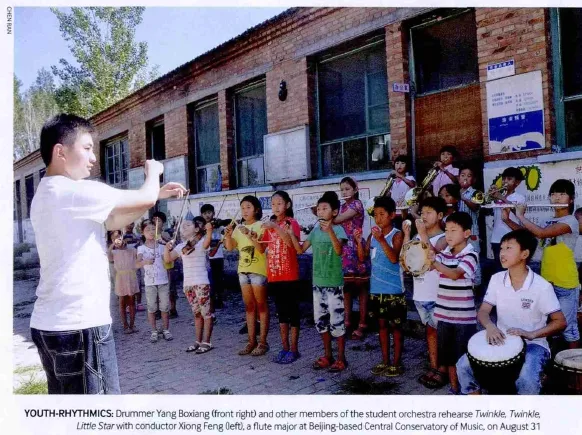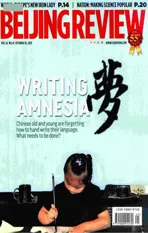The Power of the Arts
2013-06-07BeijingbasedfoundationmakesartseducationaccessibletorurallearnersByChenRan
A Beijing-based foundation makes arts education accessible to rural learners By Chen Ran
The melody ofTwinkle, Twinkle, Little Starfloated from Duancun Township in north China’s Hebei Province. More than 40 pupils were playing orchestral instruments in accompaniment of choir peers at the inauguration ceremony of their new campus on September 28.
Each performer, aged between 7 and 11, revealed a sense of professionalism no different to one in any world-class orchestra, although their technique still needs refinement. Standing alongside were volunteer teachers supported by Hefeng Art Foundation from Beijing, some 150 km away,who have visited every weekend since March to offer free classes in the arts.
When the song fi nished, the applause was deafening. Six months of learning had clearly paid off.
Dream a little dream
Covering an area of 20,000 square meters, the new Duancun School campus has combined three local elementary schools—Dongdi, Xidi and Henancun—into one, benefiting some 1,000 pupils.
Li Feng has been working on the new campus since 2011 and is the founder of Hefeng Art Foundation, the country’s first private foundation aimed at providing arts education,popularization and promotion. The 50-something businessman has loved the arts since childhood and believes in them strongly.
“I think the arts are particularly useful in helping with poverty alleviation in developing countries like China, which has a large rural population,” Li toldBeijing Review. “I believe that the spiritual power of the arts can act as a social remedy or tool to be used against poverty.”
That was the starting point for the foundation. One such project involved free weekend arts classes focusing on ballet, musical instruments, drama, choir singing and painting as a complement to the school curriculum in Duancun, the hometown of Li’s father.

“I think arts education can bring self-confidence and a sense of pride to rural children,which they didn’t have in the past,” Li said. “In fact, there is little difference between children in rural and urban areas. The only problem is the difference in educational resources available to each group. Children in rural areas have far less access to any form of arts education.”
Due to a shortage of teachers, there were no arts classes available for some 600 pupils in Duancun before March.
The volunteer teachers the foundation invited all came from well-respected national-level arts institutions in Beijing, such as the Central Conservatory of Music, the Central Academy of Drama, the China Philharmonic Orchestra, and the Beijing Dance Academy.They also helped initiate teaching plans for local elementary schools.
Life-changing symphony
In June 2012, Hefeng Art Foundation launched a ballet training center at Duancun. It also finished recruitment for the children’s choir and orchestra within six months. All fi ve arts classes opened this spring.
Li’s memories of orchestra recruitment remain fresh. The children were surprised and curious about the instruments, which seemed unobtainable and had nothing to do with their usual routine.

PRACTICE MAKES PERFECT: Li Ziyi (right)and her peers continue their ballet practice during summer vacation
“That scene had so much contrast. It represented two completely different walks of life.The kids were all from rural families and they were looking at these symbols of refinement and class,” Li recalled.
“But I saw the sense of accomplishment and pride in their eyes as soon as they could play. They were all eager to share their joy with others,” he continued.
Drummer Yang Boxiang was the shining star of the orchestra. The sixth-grade pupil topped the percussion class, with his mother Feng Yuehong, 42, listening in and making notes to guide his practice back home.
“My son has such a wonderful teacher and the chance to learn music thanks to Hefeng Art Foundation,” Feng toldBeijing Review. “Before learning music, he either watched TV or played video games after school. It is great to see him fi nally learning something useful.”
Learning to follow a beat without an instrument in front of them was the focus for pupils during the fi rst three classes. However,six of the eight dropped out because of boredom. Yang was one of the only two that continued learning.
“He found a bruise on his thigh one day caused by tapping out the beats on his legs,”Feng recalled. “He loves drumming. His father was working in Beijing so we decided to buy him a real drum and a metronome.” Feng was very pleased to see the change in her son. “He looks smarter and is more easy-going since learning percussion. He has more con fi dence,”she noted. “Before, he was a shy boy and was quiet in public. Now he looks great!”
“I want to be the best drummer in the world!” Yang said. “I am grateful to my teacher. I can’t learn drumming without him.”
Yang’s teacher, Zhang Yujin, comes from the Central Conservatory of Music. The 19-year-old is the youngest volunteer teacher in the program.
“I think they have changed a lot. They are more active and energetic after drumming.It helps enhance their sense of music. Their performance is better, and I’m proud of their progress,” Zhang said. “I think the program is very meaningful. I took part in it from the very fi rst day. It helps local kids and the whole community learn about music. This is a good thing.I will keep on coming here if it is possible and support the program.”
Meng Ziyan, who guides the choir, also comes from the Central Conservatory of Music.The 22-year-old baritone major agrees with Zhang.
“The pupils could not hit any notes at the very beginning. They couldn’t even sing a C major scale. Every note they sang sounded the same,” he recalled. “Now they can sing some simple songs and do better. They are interested in learning new tunes, too,” he continued. “I think the program helps them learn more and expands their world view. I’m willing to help them, though as a student I need to learn a lot more myself. I hope I can pass down what my teachers taught me.”
“Since the fi rst ballet class opened, the girls have changed a lot,” Li said proudly. “Their skills,looks and temperament are all transforming!”He attributed such changes to joint efforts made by the pupils, their parents and teachers.
Li Ziyi is a sixth grader and has studied folk dancing for two years. Now she is the lead dancer of the class. “For me, ballet changed my life, my ideals, and my temperament,” she toldBeijing Review.“I dream of performing at the National Center for the Performing Arts in Beijing one day. It is ballet that fuels my dreams.”
Li Ziyi’s mother, Feng Shuying, 35, thinks her daughter has undergone immense change since starting ballet. “She is more capable than before. The way she walks looks better. Ballet makes her look elegant,” Feng Shuying said.“I can tell that she really loves it. I’m glad I know what she aspires to. Let’s see how far she can get. She was born in a better time than we were.We didn’t have the chance to learn any arts. She has the chance, and we will support her.”
Currently, while there are certain problems in promoting arts education across rural areas such as lack of funds and teachers, Li Feng retains his belief in the power of arts.
“Art provides endless spiritual nutrition to children. A lot of arts activities take place in a group, which develop coordination and team work,” he said. “They will have a better perspective to plan their futures.”
